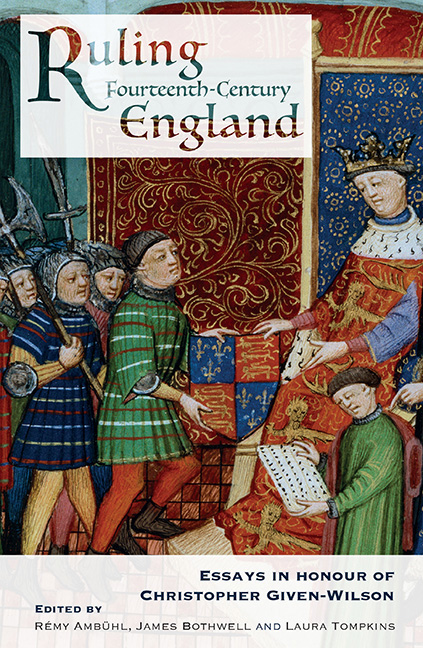Book contents
- Frontmatter
- Contents
- Contributors
- Abbreviations
- Introduction
- The Efficiency of English Royal Administration in the Last Years of Edward I
- Government and Market in the Early Fourteenth Century
- Kings' Clerks: The Essential Tools of Government
- Edward II: Favourites, Loyalty and Kingship
- The Perils of Lordship: The Life and Death of William Tuchet (c. 1275–1322)
- ‘War’, ‘Rebellion’ or ‘Perilous Times’? Political Taxonomy and the Conflict in England, 1321–2
- The Carlisle Roll of Arms and the Political Fabric of Military Service under Edward III
- What's in a Title? Comital Development, Political Pressures and Questions of Purpose in Fourteenth-Century England
- Edward the Black Prince: Lordship and Administration in the Plantagenet Empire
- ‘Said the Mistress to the Bishop’: Alice Perrers, William Wykeham and Court Networks in Fourteenth-Century England
- The Politics of Surrender: Treason, Trials and Recrimination in the 1370s
- Richard II in the Mirror of Christendom
- Bibliography
- Index
- Tabula Gratulatoria
‘Said the Mistress to the Bishop’: Alice Perrers, William Wykeham and Court Networks in Fourteenth-Century England
Published online by Cambridge University Press: 18 September 2019
- Frontmatter
- Contents
- Contributors
- Abbreviations
- Introduction
- The Efficiency of English Royal Administration in the Last Years of Edward I
- Government and Market in the Early Fourteenth Century
- Kings' Clerks: The Essential Tools of Government
- Edward II: Favourites, Loyalty and Kingship
- The Perils of Lordship: The Life and Death of William Tuchet (c. 1275–1322)
- ‘War’, ‘Rebellion’ or ‘Perilous Times’? Political Taxonomy and the Conflict in England, 1321–2
- The Carlisle Roll of Arms and the Political Fabric of Military Service under Edward III
- What's in a Title? Comital Development, Political Pressures and Questions of Purpose in Fourteenth-Century England
- Edward the Black Prince: Lordship and Administration in the Plantagenet Empire
- ‘Said the Mistress to the Bishop’: Alice Perrers, William Wykeham and Court Networks in Fourteenth-Century England
- The Politics of Surrender: Treason, Trials and Recrimination in the 1370s
- Richard II in the Mirror of Christendom
- Bibliography
- Index
- Tabula Gratulatoria
Summary
On 20 January 1385 a writ was issued to William Wykeham, bishop of Winchester, with the order to keep within his custody:
all the jewels that had been placed in his hands by Alice, who was the wife of William de Wyndesore, knight, after the judgement rendered against her in parliament in 1 Richard II, and pledged for a sum of money received by her of the bishop, being yet in his hands as the king has learned of a surety.
Or, in other words, Wykeham was being accused of being in possession of goods that were forfeit to the crown. Alice Wyndesore, or Alice Perrers as she is better known, rose to prominence at court during the 1360s as the notorious and powerful mistress of Edward III, where she established herself as a dominant political force until the death of the king in June 1377. A deeply unpopular and controversial figure, only a few months after Edward died Alice was put on trial in the opening parliament of the reign of Richard II, where she was sentenced to forfeiture and banishment from the realm. At the time of her conviction, the officials of the Exchequer efficiently and systematically confiscated Alice's properties and possessions. There were, however, clearly lingering rumours of secret stores of jewels and cash that had slipped through the administrative net. In September 1384, just four months before the writ to Wykeham was issued, the mayor of London, Nicholas Brembre, had been ordered to conduct an enquiry into any debts that had been owed to Alice on the day of her forfeiture, and to ascertain what goods and chattels belonging to her had been concealed from the crown at that time. Wykeham was not named as part of this investigation, but there is a strikingly similar item in the Brembre report indicating that Alice had been in possession of £20,000 of jewels, which, according to the investigators, had afterwards entered into the possession not of Wykeham but of her then husband Sir William Wyndesore, the king's former lieutenant in Ireland.
The accusation against Wykeham appears to have been a direct result of his loss of royal favour at this time.
- Type
- Chapter
- Information
- Ruling Fourteenth-Century EnglandEssays in Honour of Christopher Given-Wilson, pp. 205 - 226Publisher: Boydell & BrewerPrint publication year: 2019



